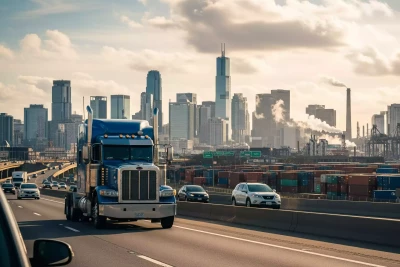Stability, Enforcement, and the Road Ahead for Trucking
September 2, 2025
 The trucking industry continues to serve as one of the most telling indicators of broader economic health. Just as interest rate changes ripple through the economy, regulatory and enforcement shifts in trucking can create wide-reaching effects that impact capacity, safety, and freight rates. Today, the industry faces challenges that demand not only smart policymaking but also consistent enforcement and leadership.
The trucking industry continues to serve as one of the most telling indicators of broader economic health. Just as interest rate changes ripple through the economy, regulatory and enforcement shifts in trucking can create wide-reaching effects that impact capacity, safety, and freight rates. Today, the industry faces challenges that demand not only smart policymaking but also consistent enforcement and leadership.
Recent efforts to tighten enforcement on non-domiciled drivers and cabotage violations, while long overdue, raise questions about how much capacity could be pulled from the market. Even small percentages matter in an industry as finely balanced as trucking. Much like adjusting interest rates, the true effects of these policies won’t be immediate. It may take several quarters before the market fully feels the impact, and that unpredictability can make it difficult for carriers and shippers alike to plan ahead.
Rising interest rates are another force weighing heavily on the industry. For younger generations of drivers, brokers, and business owners, today’s rates feel unprecedented. But for those who lived through the double-digit mortgages of the late 1970s and early 1980s, current rates are a reminder of how much borrowing costs influence every corner of the economy, from housing starts to freight demand. Trucking, often the first sector to show signs of economic downturn or recovery, remains closely tied to these broader financial shifts.
Will economic stability persist despite growing turmoil in the supply chain? Watch the latest episode of the Stay In Your Lane Podcast for key insights from industry leaders.
Fraud schemes and unlawful brokering also continue to threaten the integrity of the marketplace. Fly-by-night operations undercut legitimate brokers, steal freight, and depress rates, hurting both drivers and carriers. Fighting even one case of double brokering can cost a company thousands of dollars with little chance of meaningful resolution. The industry at large would benefit from strong, consistent enforcement from the FMCSA. Clear penalties and reliable oversight would go a long way toward leveling the playing field and protecting those who follow the rules.
“Legitimate brokers are competing against fly-by-night operations that are stealing freight, undercutting freight rates, everything under the sun,” says Land Line Magazine Managing Editor Jami Jones. “That hurts the drivers, that hurts the industry overall.”
Perhaps the most encouraging development is the possibility of stronger leadership at the FMCSA. For too long, the role of administrator has often been a stepping stone rather than a long-term commitment. Without consistent leadership, the agency struggles to build the institutional knowledge and continuity needed to make lasting improvements. The hope now is that a dedicated leader, one who understands the industry and values the role, could bring stability and direction to trucking policy at a time when it’s sorely needed.
“We may finally have an FMCSA director who wants the job…someone who actually might think the job is the job they always wanted, and who will stay long enough to make a difference,” says Radio Nemo’s Jimmy Mac.
None of these changes would be possible without the voices of professional drivers. Years of relentless advocacy have brought attention to critical issues like cabotage, fraud, and safety enforcement. When drivers speak up to regulators, lawmakers, or through industry groups, their collective voice makes a difference. The recent progress on pro-trucker policies is a direct result of that persistence.
 The road ahead for trucking is uncertain, shaped by economic pressures, regulatory shifts, and the ongoing battle against fraud. But with consistent leadership, effective enforcement, and continued driver advocacy, the industry has an opportunity to move toward greater stability and fairness. Just as truckers are the first to feel the changes in freight demand, they will also be the first to see the benefits of a stronger, more predictable regulatory environment.
The road ahead for trucking is uncertain, shaped by economic pressures, regulatory shifts, and the ongoing battle against fraud. But with consistent leadership, effective enforcement, and continued driver advocacy, the industry has an opportunity to move toward greater stability and fairness. Just as truckers are the first to feel the changes in freight demand, they will also be the first to see the benefits of a stronger, more predictable regulatory environment.
At Triple T Transport, we recognize the challenges that carriers face in today’s marketplace, from rising costs to unfair competition. Our team is committed to supporting our carrier partners with reliable opportunities, transparent practices, and a long-term dedication to building trust. As the industry evolves, we remain focused on helping our supply chain partners navigate uncertainty while working together to create a stronger, safer, and more sustainable future for trucking.














